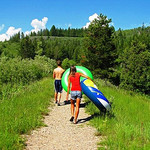
by Ricki McWilliams | May 18, 2015
 Beware of Hidden Dangers
Beware of Hidden Dangers
We all know that taking safety measures, such as using car seats correctly or basic childproofing, for our children is important. But what about “hidden dangers?” One major hidden danger can be the family vehicle. As summertime approaches and the heat is upon us, the dangers of leaving a child in a vehicle can be just as deadly as being involved in a traffic accident.
What’s the Danger?
While abduction may be the first concern that comes to mind when a child is left unattended in a vehicle, another concern is temperature. Outside temperatures ranging from 80 – 90 degrees can translate to temperatures of 120-140 degrees inside a vehicle (even with a window cracked). At such increased temperatures, children are at risk for heat stroke, high fever, dehydration, seizures, stroke, and even death. Even on a milder day (70 degrees), the inside of your car can reach temperatures over 100 degrees. While there may be several reasons a child is left in the vehicle unattended, the National Highway Traffic Safety Administration reports these as the top three:
- Infants and toddlers are simply forgotten in their car seat
- Toddlers or preschoolers sneak into the car to play and can’t get out
- Kids get trapped in the trunk
Heat Isn’t the Only Issue
The dangers of being left alone aren’t limited to a child overheating. Ever think about leaving the car running with the air conditioner on? Even if just for a few minutes, a child can be abducted, engage the transmission and drive off, get stuck in a power window, or press the power locks without knowing how to unlock the doors when you return. When wondering if it’s okay to leave you child in the car ~ just don’t do it.
Safety Tips to Keep Your Kids Safe:
- Don’t leave them in a car, which can quickly heat up, especially on a hot, sunny day
- Always lock your car and secure the keys so your kids can’t get to them
- Warn your kids about playing in the car by themselves without adult supervision
- Install a trunk release mechanism so they can’t get trapped in the trunk
- Get your kids out of the car first, and then worry about getting the groceries, etc., out of the car when you get home
- Make sure child care providers and day care workers have a plan to ensure kids aren’t left in the day care provider’s car or van
Deaths of children in hot cars*
- 2015: 2 (as of May 12, 2015)
- 2014: 30
- 2013: 43
- 2012: 34
- 2011: 33
- 2010: 49
Looking for a Child Passenger Safety Technician to complete a car seat check? Contact Ricki McWilliams, rickim@ufl.edu to find a technician in your area.
For more information on protecting children from other unintentional injuries click here.
Enjoy your summer and enjoy it safely!
*Source: Details are available at http://noheatstroke.org

by Ricki McWilliams | Apr 14, 2015
 Spring has Sprung
Spring has Sprung
Still trying to get past those winter blues? Get outside, enjoy the Spring weather, and do something active! Regardless of age or fitness level it is important to incorporate physical activity into your daily routine.
Some people might say they cannot be active due to lack of time however, fitting in physical activity can be simple and easy. As little as 10 minutes of activity at a time can provide healthful benefits. Being physically active can limit conditions such as heart disease, type 2 diabetes, high blood pressure, high blood cholesterol, and risk of stroke (Physical Activity, 2015). There are many types of physical activity; aerobic, muscle strengthening, bone strengthening, and balance and stretching.
To make exercise easy, fun and beneficial just mix and match:
- take a 10 minute walk at lunch time
- walk the dog
- garden
- lift weights
- join an exercise group
- practice yoga
- jump rope
- swim
Make being active a family affair. Strengthen family bonds and improve quality of life through a variety of outdoor activities that provide exercise and entertainment. Outdoor family fun activities include but are not limited to: walking, hiking, swimming, running, bicycling, kayaking, canoeing, and tree climbing. The body is able to convert sunshine into vitamins and when physically active the body releases good endorphins improving mood/outlook. Good for the mind and body, outdoor activities can also increase awareness of the environment, as well as, be easy on the budget.
Click here for more tips on how to increase physical activity at home, work and play. Make being active a part of your daily routine.
Still feeling like there are barriers keeping you from being active? Read more here on overcoming common barriers to physical activity.
Resource:
Physical Activity. (2015). http://www.choosemyplate.gov/physical-activity/why.html

by Ricki McWilliams | Jan 27, 2015
 America Saves Week 2015 ~ February 23 – February 28
America Saves Week 2015 ~ February 23 – February 28
America Saves Week is coordinated by America Saves and the American Savings Education Council. Started in 2007, the Week is an annual opportunity for organizations to promote good savings behavior and for individuals to assess their own savings status. Typically, thousands of organizations participate in the Week, reaching millions of people. This campaign encourages individuals and families to save money and build personal wealth.
The 2014 Annual National Survey Assessing Household Savings (released during America Saves Week) revealed that while most Americans are meeting immediate financial needs, they are worse off than several years ago.
- Only about one-third of Americans feel prepared for their long-term financial future.
- 68 percent reported they are spending less than their income and saving the difference – down from 73 percent in 2010.
- Nearly two-thirds of respondents (64%) said they “have sufficient emergency savings to pay for unexpected expenses like car repairs or a doctor visit” – down from 71 percent in 2010.
- 76 percent said they are reducing their consumer debt or are consumer debt-free – down from 79 percent in 2010.
To learn more about America Saves Week and Pledge to Save, visit: www.AmericaSavesWeek.org
Set a Goal. Make a Plan. Save Automatically.
Get Involved! Events during America Saves Week include:
Ag Save$ Summit
February 23 – 9:00am CST/10:00am EST
Jackson County Extension Office, 2741 Pennsylvania Avenue, Marianna, FL 32448
(view registration link for additional locations)
FREE to register: bit.ly/AgSavesSummit
America Saves Financial Challenge – Online
February 22 – March 23
FREE to enroll: http://bit.ly/MoneyChallenge2015
Challenge Yourself to Save Money – America Saves Challenge Twitter Chat (#eXASchat)
February 24 – 2:00pm CST/3:00pm EST
Log in to Tchat.io at http://www.tchat.io/ and insert #eXASchat into the textbox that pops up so you can tweet easily and view the live Twitter stream
Where to Turn for Financial Advice – Webinar
February 25 – 11:00am CST/12:00pm EST
Free Registration: http://bit.ly/finpro2015
Personal Finance Questions – Realities & Myths – Webinar
February 26 – 11:00am CST/12:00pm EST
Free Registration: http://bit.ly/faq2015
by Ricki McWilliams | Jan 21, 2015
 Ag Save$
Ag Save$
Ag Save$ is a new initiative to bring personal finance education such as wealth building, estate planning, succession planning, asset protection, and other financial topics to agricultural producers in Florida.
Have you ever asked yourself:
How do I become financially stable?
How do I retire well?
What do I need to do to secure the future of my farm?
Let us help you find the answers.
Ag Save$, a component of the nonprofit America Saves and a partner with the University of Florida’s Institute of Food and Agricultural Sciences financial teaching and education, seeks to motivate, support, and encourage farmers and agricultural producers to save money, reduce debt, build wealth, protect assets, and plan for succession. The research-based campaign uses the principles of behavioral economics and social marketing to change behavior. Ag Save$ encourages all agricultural producers and their families to join us in a kick-off event on Monday, February 23, 2015 as well as our workshop series that starts March 24, 2015.
Ag Save$ Summit:
February 23, 2015
Registration: 8:30 a.m. (Central) 9:30 a.m. (Eastern)
Program 9:00 a.m. – 1:00 p.m. (Central); 10:00 a.m. – 2:00 p.m. (Eastern)
Locations
|
Jackson County Extension Office (host site)
2741 Pennsylvania Avenue
Marianna, FL 32448
850-482-9620
Doug Mayo: demayo@ufl.edu
|
Jay Community Center (satellite location)
5259 Booker Lane
Jay, FL 32566
850-623-3868
Blake Thaxton: bthaxton@ufl.edu |
Jefferson County Extension Office (satellite location)
2729 W. Washington Hwy.
Monticello, FL 32344
850-342-0187
Jed Dillard: dillardjed@ufl.edu |
Register Online: bit.ly/AgSavesSummit
Registration deadline: February 19, 2015
This session is complimentary
All family members are encouraged and welcomed to participate
For more information, click: Ag Saves Summit Flyer
Ag Save$ Series of Workshops:
| March 24th |
June 23rd |
July 21st |
August 18th |
| Preparing for Retirement and Other Goals |
Trimming the fat, How to manage and reduce your debt |
Securing Your Family’s and Your Farm’s Future-Part 1 |
Securing Your Family’s and Your Farm’s Future-Part 2 |
Register Online: bit.ly/AgSavesSeries
Registration deadline: March 10, 2015
For more information click: Ag Saves Program Flyer 2015

by Ricki McWilliams | Dec 11, 2014
 Being sick during the holiday season is no fun. Did you know the flu is not the only thing that can have you feeling under the weather? The Centers for Disease Control and Prevention (CDC) estimate that each year roughly 1 in 6 Americans (or 48 million people) get sick, 128,000 are hospitalized, and 3,000 die of foodborne diseases (CDC, 2014). This holiday season, UF/IFAS Extension Agents will be available to help keep you and the ones you care about safe by reminding you of the United States Department of Agriculture ‘s four steps to safer food handling this holiday season:
Being sick during the holiday season is no fun. Did you know the flu is not the only thing that can have you feeling under the weather? The Centers for Disease Control and Prevention (CDC) estimate that each year roughly 1 in 6 Americans (or 48 million people) get sick, 128,000 are hospitalized, and 3,000 die of foodborne diseases (CDC, 2014). This holiday season, UF/IFAS Extension Agents will be available to help keep you and the ones you care about safe by reminding you of the United States Department of Agriculture ‘s four steps to safer food handling this holiday season:
- Wash your hands and your cooking surfaces before you start, when you will touch different foods, and after you finish preparing a dish.
- Separate cooked foods and ready-to-eat foods from foods that still need to be prepared.
- Always cook and reheat your foods to above 140 degrees Fahrenheit.
- Chill your leftovers. Don’t let your dishes sit out without refrigerating or keeping them heated. Throw out foods that have been between 40 degrees and 140 degrees Fahrenheit for more than 2 hours.
Have a question that is not related to food safety, like:
- How do I make a brine for my turkey?
- I ran out of eggs – is there a substitute?
- I couldn’t find any buttermilk. What do I do?
…Don’t worry – call the UF/IFAS Extension Northwest District Family and Consumer Sciences (FCS) HOLIDAY FOOD HOTLINE. Northwest District FCS agents will be available 8am – 8pm CST/9 am – 9pm EST by calling 850-888-2412 (December 15 – January 1) to assist you with food preparation, food safety, or any other kitchen concerns you may have.
The best part is you can always count on UF/IFAS Extension to provide you with research-based information!
Holiday Food Hotline
850-888-2412
References:
Centers for Disease Control and Prevention (2014). “Estimates of Foodborne Illness in the United States” retrieved December 11, 2014 from http://www.cdc.gov/foodborneburden/
United States Department of Agriculture (2014). “Check Your Steps: Food Safe Families” retrieved December 11, 2014 from http://www.fsis.usda.gov/wps/portal/fsis/topics/food-safety-education/featured-campaign

 Beware of Hidden Dangers
Beware of Hidden Dangers






